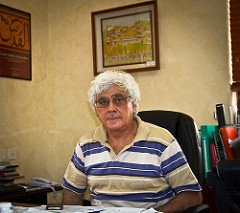Nusseibeh looks the future in the face: an interview

“The suggestion of an independent and autonomous Palestinian state is an idea of the past and hardly feasible if not nearly impossible in the current political situation.” These are not the remarks of a Jewish Israeli but of a Palestinian, probably one of the most prominent Palestinian intellectuals of the day. An interview.
Sari Nusseibeh is the president of the al-Quds University (Jerusalem) and to define his words as a discordant note in the chorus of the Palestinian political landscape is anything but a euphemism. Philosopher, member of the Palestinian delegation to Washington led by Arafat, author of several books about the Palestinian question and prominent member of Mahmoud Abbas’s Fatah party, Nusseibeh is a controversial and unpredictable persona with views that often go against the grain of current public opinion.
In his latest book, What is a Palestinian State Worth?, Nusseibeh discusses the current political situation in the West Bank by suggesting an alternative and transitional way to achieve Palestinian independence.
"If you look outside," says Nusseibeh, pointing his finger towards the big window of his office in Beit Hanina in East Jerusalem, "you can see with your own eyes what I'm talking about. To the west, you can easily recognize the Arab neighbourhoods that surround us, but if you look east you'll find Pisgat Ze’ev, a huge Israeli colony now part of East Jerusalem — the portion of the city in which, theoretically, only Palestinians should live."
There are now over half a million Israeli Jewish settlers living within the West Bank, with half of that number in East Jerusalem alone.
"How do you plan to force all those people to leave their homes, even if the houses are internationally recognized as illegal, and transfer them within the 1967 borders?” asks Nusseibeh. “This, in my opinion, is the fundamental reason why the classical idea of a two-state solution must be abandoned and why the so called ‘Green Line’ is something that does not mean anything nowadays. We must find new alternatives to end the Israeli occupation."
In support of his view regarding the impossibility of physically imposing boundaries after the 1967 Six Day War, Nusseibeh points the finger at the current political impasse between Israel and the West Bank PA government: "Over the last ten years, Israel has shifted its political centre of gravity to the right, entrenching itself in intransigent positions on the edge of xenophobia and making any type of negotiation virtually impossible. On the other hand, divisions in the Palestinian society have increased exponentially. The days of Arafat, where the possibility of achieving a lasting truce with Israel was at hand, are a long way behind us. I am not even sure that the current leadership has the same authority and unconditional support that Abu Ammar (Yasser Arafat) could rely on."
Nusseibeh also highlights how the ‘two-state solution’ has become the dominant narrative in the Occupied Territories, a mantra that if challenged can create many problems for the bearer of a new perspective.
"Unfortunately, history runs faster than ideologies. It is obvious to anyone with a spark of intelligence that the creation of two states, in the current situation, is a chimera used to distract the population (Palestinian and Israeli); one whose only aim is to preserve the status quo. We must look beyond the contingencies of the present and find a temporary solution in which the Palestinian people would feel equal to their Israeli counterparts. That is the necessary (and only) platform in order to achieve a lasting peace."
In his book, Nusseibeh suggests the creation of a transitional federal state in which the boundaries are not the current physical ones, but others based on ethnicity within which the Palestinian citizens may have the same civil rights reserved to Israeli citizens. Nusseibeh provocatively says, "Let the Jews run public affairs; but at the same time, let the Arabs at least enjoy the rights and opportunities offered by the state itself. Furthermore,” he continues, “Israel should give more power to the Palestinian Authority to enable it to have more control over its territory and cooperate with it in order to deal with extreme fringes within the West Bank."
The role of the international community — especially regarding the flood of money that has poured into the Occupied Territories in recent years — is another element that Nusseibeh recognizes as an unwitting promoter of continuing occupation.
"A couple of years ago, I publicly asked the international community, especially Europe, to block any kind of economic aid unless a clear political strategy leading to the end of the occupation had been adopted. Obviously no one paid any attention to me. The economic interests on the Palestinian side are enormous, those who were enriched in these years cannot fathom doing so without such aid, and Israel, of course, rejoices every time a Palestinian entity becomes more dependent on external resources for its functioning. Nowadays, the ‘subsidiary politics’ have obscured the view of many Palestinian politicians who seem more interested in embellishing their strongholds than ending the occupation."
The publicized, and apparently imminent, agreement between Fatah and Hamas for the creation of a unity government, with the possibility of national elections, do not find an enthusiastic reception in Nusseibeh: "Firstly, it seems to me that instead of attempting to seek an agreement, the two parties are trying to hide their differences. I am not even convinced that Hamas, judging by the tone of voice of their leader Khaled Meshal, is trying to promote non-violence. Ultimately, I think that the idea of new elections is just a smokescreen. What is the point of having new elections when you are not free, when the highest Palestinian Authority figure (Mahmoud Abbas) has to seek permission from Israel in order to move from one place to another?"